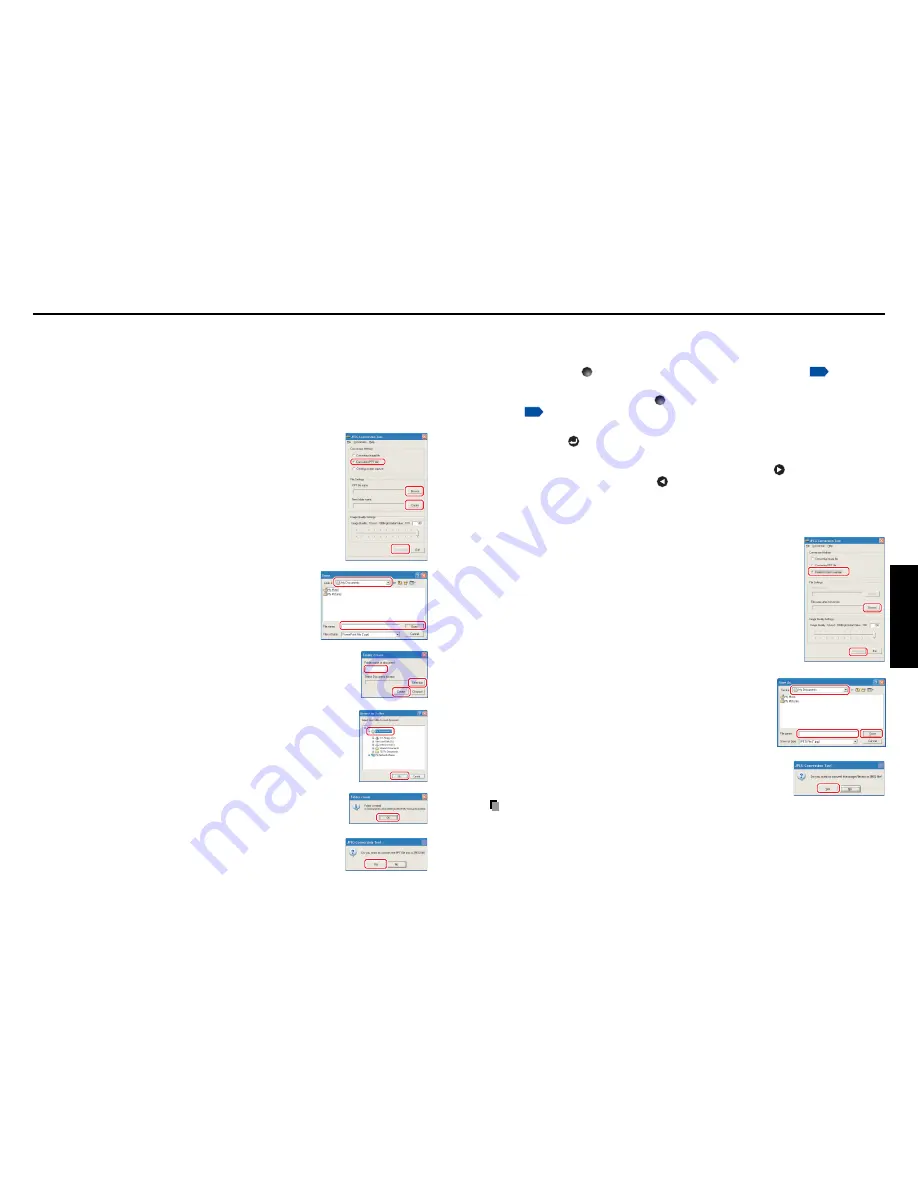
76
77
Operations
■
Making a presentation with converted JPEG files
(1) Copy the folder created by the
JPEG Conversion Tool
, or its contents, onto a
memory PC card.
(2) Use the step
1
in “
Playing a slide show from a thumbnail list
”
p.61
to display a
list of thumbnails.
(3) Follow the instructions in step
2
in “
Playing a slide show from a thumbnail list
”
p.61
to find the thumbnail of the first slide, Slide001.jpg, and move the orange
frame to it. (Select Slide001.jpg)
(4) Press the
button on the remote control. An enlarged view of the first slide
appears on the screen. This starts the presentation.
(5) To continue to the next slide, click on the remote control’s
button. To go back to
the previous slide, click on the
button.
■
Creating a screen capture and converting it into a JPEG file
This function saves the current computer screen as a JPEG file.
(1) In the
Conversion Method
field, select
Creating screen
capture
.
(2) In the
File settings
field, click on the
Browse
button for
File
name after conversion
.
The
Save As
dialog box appears.
(3) In the
Save As
dialog box:
(a) Specify the location in which to save the converted file;
(b) Enter a file name of up to 8 characters in the
File Name
field; and
(c) Click on the
Save
button.
(4) (a) In the
JPEG Conversion Tool
window, click on the
Conversion
button.
(b) A confirmation message appears. Click
Yes
.
The computer creates a screen capture, and
converts it into a JPEG file in the specified location.
When it is finished, a message appears to tell you
that a
“JPEG file has been created”
.
Note
• The maximum resolution of JPEG files created with the
JPEG Conversion Tool
is 1,024
×
768 pixels.
(1)
(1)
(2)
(2)
(4)-(a)
(4)-(a)
(3)-(b)
(3)-(c)
(3)-(a)
(4)-(b)
(4)-(b)
How to use the JPEG Conversion Tool (Continued)
■
Converting files created with Microsoft
®
PowerPoint
®
This process provides presentations without using a computer by converting
presentation files created with Microsoft
®
PowerPoint
®
into JPEG files, storing them on
a memory PC card, and displaying them in a slide show.
• To use this conversion mode, Microsoft
®
PowerPoint
®
must be installed on the
computer.
• Only static images are supported by this process. Animation and audio are not
supported.
Presentation files created with Microsoft
®
PowerPoint
®
usually
consist of several slides. For this reason, the tool creates a folder
with the name specified in step (5), below, and file for each slide
is created in the folder (starting with slide001.jpg).
(1) In the
Conversion Method
field, select
Converting PPT file
.
(2) In the
File settings
field, click on the
Browse
button for
PPT
File Name
.
The
Open
dialog box appears.
(3) In the
Open
dialog box:
(a) Specify the location of the file to be converted; and
(b) Select the PowerPoint
®
presentation file to convert,
then click on the
Open
button.
(4) In the
JPEG Conversion Tool
window, in the
File
settings
field, click on the
Create
button for
New
folder name
.
The
Folder create
dialog box appears.
(5) In the
Folder create
dialog box, in the
Folder Name
of
document field, specify a folder name of 12 characters or less.
(6) In the
Folder create
dialog box, click on the
Selection
button.
The
Browse Folders
dialog box appears.
(7) In the
Browse Folders
dialog box:
(a) Specify the location in which to save the folder; and
(b) Click on the
OK
button.
(8) In the
Folder create
dialog box:
(a) Click on the
Create
button.
A confirmation dialog box appears;
(b) Click on the
OK
button.
(9) (a) In the
JPEG Conversion Tool
window, click on the
Conversion
button.
(b) A confirmation dialog box opens. Click
Yes
.
The computer begins to convert the file. When it finishes,
a message appears informing you that a
“JPEG file has
been created”
.
(1)
(2)
(4)
(9)-(a)
(1)
(2)
(4)
(9)-(a)
(3)-(b)
(3)-(a)
(6)
(8)-(a)
(6)
(8)-(a)
(5)
(5)
(7)-(a)
(7)-(b)
(7)-(b)
(8)-(b)
(8)-(b)
(9)-(b)
(9)-(b)









































